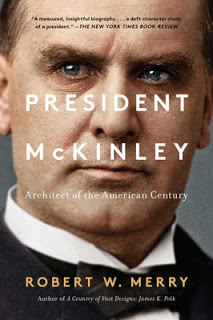
President McKinley: Architect of the American Century
by Robert W. Merry
reviewed December 2018
For me, Robert W. Merry’s biography of President McKinley is about as perfect as a biography as one can read. I’ve read a lot of them. I’ve read many that were too short, too long, too detailed, too unbalanced, and there were many that I struggled to stay awake while trying to finish. This book seemed perfectly proportioned. I never found myself mentally drifting. The only drawback that I can state is that I wanted more. But shouldn’t that always be the case with a great book?
We read a fair amount of William McKinley’s childhood, his service in the U.S. Civil War (he’s quite the soldier; he achieves the rank of Major near the end of the war at the young age of 22), his career as a young lawyer, and a husband to his young love, Ida. Then he enters politics, becomes the protégé of the current president Rutherford Hayes, and is essentially chosen by the Ohio political ‘boss’ Mark Hanna to be molded into greatness – eventually becoming President himself. What makes this book so special and so unique, though, is the subtitle ‘Architect of the American Century’.
When one thinks of the word ‘architect’, they think of a builder and/or designer. This is what McKinley essentially was. Then, when we hear ‘THE American Century’, we’re talking about the twentieth century, which McKinley was the president of when it began. For America to grow and prosper in this new century, a strong leader is required. A leader is needed who understands how fast the world is changing, and ensuring the nation adapts to this change while still licking some wounds from the U.S. Civil War and the aftermath of Reconstruction.
This book spends a great bit of time talking about worldwide events where the United States steps in and makes things happen. We read about Hawaii (not a U.S. state nor an annexation of the U.S. at this time), Cuba, China, and The Philippines. There’s a lot of subjugation and suffering in those places, and opportunists see ways where America can make its mark, and also expand the borders, relatively speaking, from where they currently are. Does the U.S. belong in these places? Is it necessary to go to war in places like Cuba and The Philippines? Isn’t the main goal nothing more than colonization? These are fair questions, and one where not all can agree on the answers. The arguments McKinley makes are that the presence of the U.S. in these countries is a win/win. These neighbors really are better off with American presence, and much more good is essentially done than is harm. I also learned more about the Spanish-American War (which only lasted about four months) in this book than any other book I’ve read.
McKinley also sets the goal for keeping the nation strong at home as well. He’s a big advocate of the protective tariff (which his predecessor Grover Cleveland basically abandoned) while at the same time attempting the notion of reciprocation with other nations to ensure a delicate global balance is achieved financially. He also sets the wheels in motion for the building of the Nicaraguan Canal that will aid in the strength of the nation during this new century (the canal location would eventually be moved to the Panama several years after McKinley is out of office).
Throughout all this, it becomes apparent that McKinley isn’t necessarily a bold visionary. He seems to be rather quiet and introverted. His strengths seem to rely more on REACTING to events as opposed to INITIATING them. Not that there’s anything really wrong with this style, as long as the country is progressing in the right direction. This seems to be the overall theme of the book. We rarely read of any misgivings or faults of the man. His mannerisms and demeanor seem to always dictate positive results. Perhaps someone with a deeper understanding of history during the turn of the century might be able to debate the opinions the author sets forward, but you get the impression that McKinley is always quietly doing what’s right for the nation.
Strangely, it’s near the end of the book when we meet the man who seems McKinley’s complete opposite. A man everyone knows, Governor of New York and former Rough Rider Theodore Roosevelt. In many cases, Merry seems to not be too fond of Roosevelt. Although he doesn’t state it specifically, he paints the picture of Roosevelt being a bit of an arrogant loud-mouthed windbag. When McKinley is nominated for a second term, Roosevelt is eventually nominated as his Vice-Presidential running mate. Strangely, this portion of the story is only briefly touched, and one wishes the details could have been more expanded. We must remember that candidates for president didn’t choose their running mates back then, and one almost gets the feeling that, whereas the two men were cordial towards each other, their personalities were too different to where any sort of cohesive bond could exist between the men.
The pairing, sadly, is short lived, as McKinley is gunned down by an assassin’s bullet only a few months into his second term. Again, this part of the narrative seemed too brief, and I would have liked to have read more about the episode, the assassin, the reasons, etc. Like William McKinley’s life, I felt this book was abruptly cut short.
Still, this was an outstanding biography. Not only was the account of the man outstanding, but also the accounting of the times and events of the beginning of 20th century America as well.
Go to the Next Review
Back To Main Page
E-mail your thoughts and opinions to Clem: clem@clemsmusicreviews.com